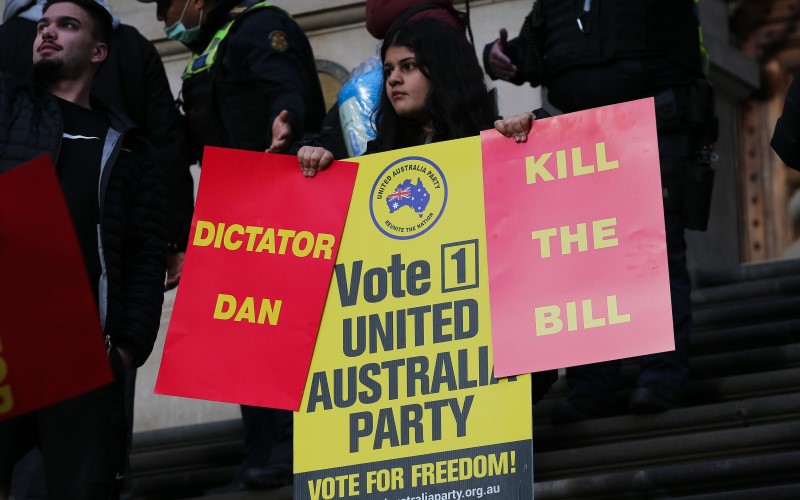United Australia Party is invoking freedom to win votes. So is the prime minister
November 27, 2021
‘Freedom’ has been a rallying point for those disaffected by Covid restrictions, and Clive Palmer’s UAP is trying to capitalise on it.
Protests against the Covid lockdowns imposed in Victoria over the past five months have achieved particular virulence at various times and have been given widespread coverage in the mass media. But are they simply a response to Victorias stringent lockdowns or do they go deeper than this?
In the past 10 days such demonstrations have moved up another step with a minority of the demonstrators threatening violence against the Victorian Premier Daniel Andrews. The most conspicuous of these threats was a wooden gallows replete with hangmans noose being driven past Parliament House on a trailer. In response, commentsfrom Matthew Guy and Scott Morrison came thick and fast and these have just made the situation about the demonstrators aims and their political ambitions more confused.
Several commentators have focussed on the likely heterogeneity of the crowd.
Single-issue anti-vaxers have been conflated with QAnon members and a rag-bag of other extreme right groups, seemingly becoming more visible as the federal election looms closer. JoshRoosehas argued that the movement is riddled with far-right and alt-right extremists who pose one of the more significant challenges to Australian democracy in recent memory. But it may not simply be a random group of people with a set of diverse complaints about the Victorian government encapsulated in the figure of Andrews? Their anger may be the culmination of many years of discontent?
It has frequently been noted that a range of authoritarian populist movements have sprung up across the world, including in parts of Europe, Turkey, Venezuela and Brazil, and in America during and leading up to the Trump presidency.
Such movements have long existed in Australia with notable examples being groups centred around Joh Bjelke-Petersen and Pauline Hanson, with a more recent example of populism represented by Clive Palmers United Australia Party.
The latter, in particular, has been spending vast amounts of money on advertising in the mass media with the tagline: WE CAN NEVER TRUST THE LIBERALS, LABOR OR GREENS AGAIN.
Above all, in a most opportunistic manner, it has begun projecting itself as the party of Freedom with a capital F, though apparently of nothing else.
Freedom is sufficiently vague to function as a rallying point, bringing together disgruntled people, in increasing numbers, for whom the Covid situation over the last two years has brought much disaffection to a head. Given the importation of some of the language and imagery from right-wing groups in America one has to ask if this series of increasingly dramatic demonstrations though with little actual violence now reflects something more than just the frustrations and uncertainty caused by the Covid restrictions.
Since the early eighties there has been a well-documented transformation in governance, economy and culture of most European and Anglo-centric countries and even beyond this, plus a strong move towards gender equality and multiculturalism. For the first few decades of this transformation the majority of the population scarcely noticed much change, change exacerbated by the ubiquity of digital technology and the ease of communication it provides. Recognition is coming to a head now.
For a large percentage of the population the supposed benefits of the withdrawal of governance and the dominance of the market have not produced the lifestyle improvements they were promised. Instead, work has become more insecure, wealth inequity has exploded and, in Australia at least, housing has almost ceased to be an option for the younger generations.
One of the cultural shifts associated with neoliberal governance has been an excessive individuality, pushed strongly by the very idea of the market as an instrument for mediating individual preference. And over the past two decades a similar kind of individuality has also been given tremendous airplay at the popular level by the ubiquity of so-called reality television. Its characters place individual choice over community responsibility, aspiration over sharing, and freedom to act in a manner favouring oneself over those around one. As such, and even if it is not theorized in a coherent way, the freedom from constraining forces has acquired considerable emotive value.
This has been severely exacerbated during the Covid restrictions when an easily identifiable external body, that is, the government, imposes limitations on behaviour, limitations not seen in living memory. As such an appeal to Freedom can unify many discontents that seem to all arise when external limitations are placed on individual activity.
The fact that neoliberal governance, supposedly predicated on the relative freedom of individual choice, has essentially resulted in corporate welfare and diminished choice for many groups in society is likely not in the consciousness of most of those involved in the recent demonstrations against government regulation. Nor is the paradox of somebody like Clive Palmer spending millions on advertising Freedom, demonstrating a financial freedom completely denied to most other people. This paradox is heightened by the underlying aim of the UAP being to see the LNP returned.
Whether any of this will be effective, and how that effectiveness might be measured, remains to be seen. The prime minister is spruiking greater freedoms for travellers and the return of international students, and has over the past few months been urging some state governments to be less stringent on their restrictions. In doing this he places himself firmly within the trope of Freedom without needing to define it precisely a trope that has always had resonance within traditional Liberal Party thinking and amongst those whose appeal is to the populist UAP. It also allows him to avoid spelling out any serious policies.
The underlying message of many of the people who participate in the kinds of demonstrations we have seen is a mistrust of government, again another theme that the prime minister has been mouthing. Superficially this might also be seen to stand firmly within the neoliberal ethos of withdrawal of government from the economy and peoples lives. Yet the massive amounts of money wasted on JobKeeper testify to the underlying truth that government intervention, not withdrawal, is a central part of neoliberal welfare.
The test of the demonstrators zeal will be revealed if the demonstrations continue and if the participants off any coherent policy framework for the country. For the UAP, Freedom will be ditched as its motto if the Coalition wins the next federal election.

